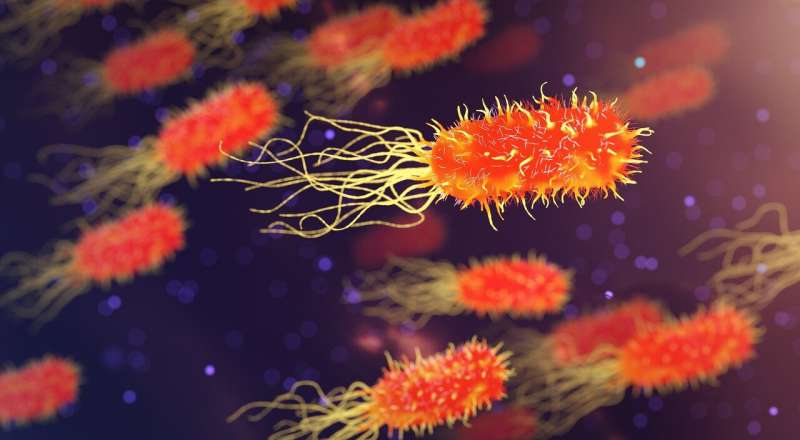Bacterial sex drives evolution of microbes to conquer and colonize the gut

Bacterial sex drives evolution of microbes to conquer and colonize the gut. This discovery constitutes a paradigm shift and opens the possibility to design phage-targeted therapies capable of dealing with the aftermath of infection and antibiotic usage, as well as antibiotic-resistant bacteria.
Most of what we know about bacterial colonization of the gut comes from studies with pathogenic bacteria in highly artificial laboratory models or disease contexts. Standard experimental models, which focus on infections with pathogenic bacteria and continuous antibiotic treatment, have not detected phage-driven horizontal gene transfer (HGT) and suggest that bacteria colonizing the gut evolve mainly through accumulation of mutations. In a surprising finding, the work of the IGC researchers now shows that HGT, not mutations, is the first evolutionary mechanism driving the pace and outcome of bacterial evolution in a healthy gut.
Escherichia coliis a common colonizer of the human intestine as well as a potential pathogen. The colonization outcome is greatly influenced by different speeds and modes of evolution of this opportunistic bacterium.E. colican evolve through mutations, which are then inherited by daughter cells, or through a process of recombination, i.e. bacterial sex, in which genetic material is shared between unrelated individuals. In the mouse and human intestine, this transfer of genetic material involves temperate bacteriophages (phages), viruses that infect bacteria and integrate into the bacterial chromosome as prophages, a process called lysogeny. Prophages can later extricate themselves (and their genetic information) from the bacterial DNA and infect other bacteria in the gut microbiome.
Nelson Frazão, a post-doctoral researcher in Isabel Gordo´s lab and junior author of the study, says: "Phages that are often classified as selfish reveal their altruistic side in the gut, providing a metabolic advantage to their bacterial host to conquer and colonize the gut." The phage genetic material that is transferred enables bacteria to gain access to specific carbon sources present in the gut, which provides a fitness advantage to phage-carrying (lysogenic) invader bacteria.
"We found that the classical evolution model does not apply, and in fact horizontal gene transfer greatly overrides the contribution of evolution through accumulation of mutations in the intestine of a healthy mouse," says the investigator Isabel Gordo. "With this work, we now understand better how evolution works in normal, healthy hosts," says Nelson Frazão, junior author of the publication.
More information: Nelson Frazão et al. Horizontal gene transfer overrides mutation in Escherichia coli colonizing the mammalian gut, Proceedings of the National Academy of Sciences (2019). DOI: 10.1073/pnas.1906958116
Journal information: Proceedings of the National Academy of Sciences
Provided by Instituto Gulbenkian de Ciência (IGC)



















